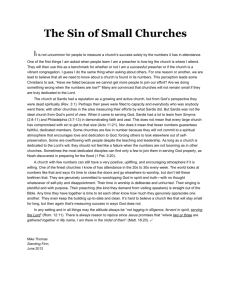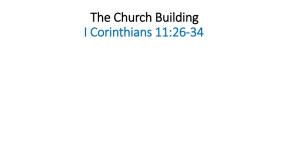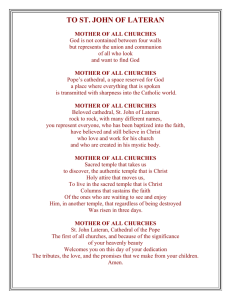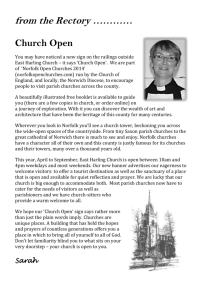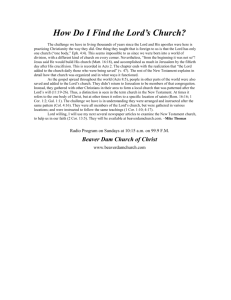Most Important Table Leg - Beaver Dam Church of Christ
advertisement
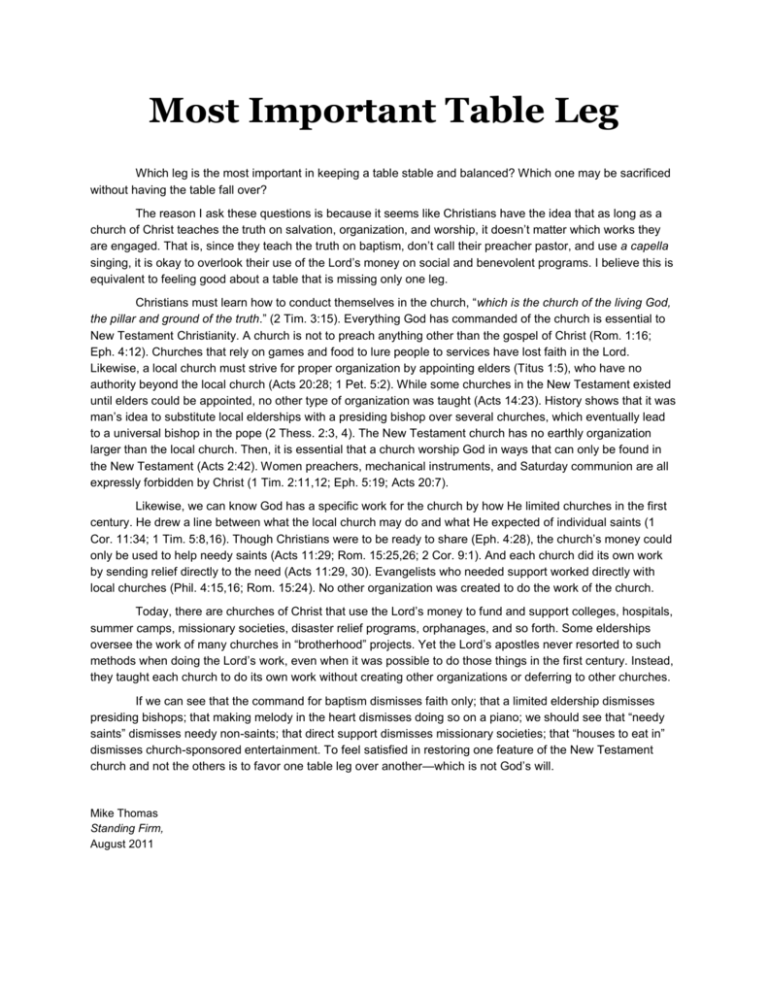
Most Important Table Leg Which leg is the most important in keeping a table stable and balanced? Which one may be sacrificed without having the table fall over? The reason I ask these questions is because it seems like Christians have the idea that as long as a church of Christ teaches the truth on salvation, organization, and worship, it doesn’t matter which works they are engaged. That is, since they teach the truth on baptism, don’t call their preacher pastor, and use a capella singing, it is okay to overlook their use of the Lord’s money on social and benevolent programs. I believe this is equivalent to feeling good about a table that is missing only one leg. Christians must learn how to conduct themselves in the church, “which is the church of the living God, the pillar and ground of the truth.” (2 Tim. 3:15). Everything God has commanded of the church is essential to New Testament Christianity. A church is not to preach anything other than the gospel of Christ (Rom. 1:16; Eph. 4:12). Churches that rely on games and food to lure people to services have lost faith in the Lord. Likewise, a local church must strive for proper organization by appointing elders (Titus 1:5), who have no authority beyond the local church (Acts 20:28; 1 Pet. 5:2). While some churches in the New Testament existed until elders could be appointed, no other type of organization was taught (Acts 14:23). History shows that it was man’s idea to substitute local elderships with a presiding bishop over several churches, which eventually lead to a universal bishop in the pope (2 Thess. 2:3, 4). The New Testament church has no earthly organization larger than the local church. Then, it is essential that a church worship God in ways that can only be found in the New Testament (Acts 2:42). Women preachers, mechanical instruments, and Saturday communion are all expressly forbidden by Christ (1 Tim. 2:11,12; Eph. 5:19; Acts 20:7). Likewise, we can know God has a specific work for the church by how He limited churches in the first century. He drew a line between what the local church may do and what He expected of individual saints (1 Cor. 11:34; 1 Tim. 5:8,16). Though Christians were to be ready to share (Eph. 4:28), the church’s money could only be used to help needy saints (Acts 11:29; Rom. 15:25,26; 2 Cor. 9:1). And each church did its own work by sending relief directly to the need (Acts 11:29, 30). Evangelists who needed support worked directly with local churches (Phil. 4:15,16; Rom. 15:24). No other organization was created to do the work of the church. Today, there are churches of Christ that use the Lord’s money to fund and support colleges, hospitals, summer camps, missionary societies, disaster relief programs, orphanages, and so forth. Some elderships oversee the work of many churches in “brotherhood” projects. Yet the Lord’s apostles never resorted to such methods when doing the Lord’s work, even when it was possible to do those things in the first century. Instead, they taught each church to do its own work without creating other organizations or deferring to other churches. If we can see that the command for baptism dismisses faith only; that a limited eldership dismisses presiding bishops; that making melody in the heart dismisses doing so on a piano; we should see that “needy saints” dismisses needy non-saints; that direct support dismisses missionary societies; that “houses to eat in” dismisses church-sponsored entertainment. To feel satisfied in restoring one feature of the New Testament church and not the others is to favor one table leg over another—which is not God’s will. Mike Thomas Standing Firm, August 2011


